WELL BEINGS
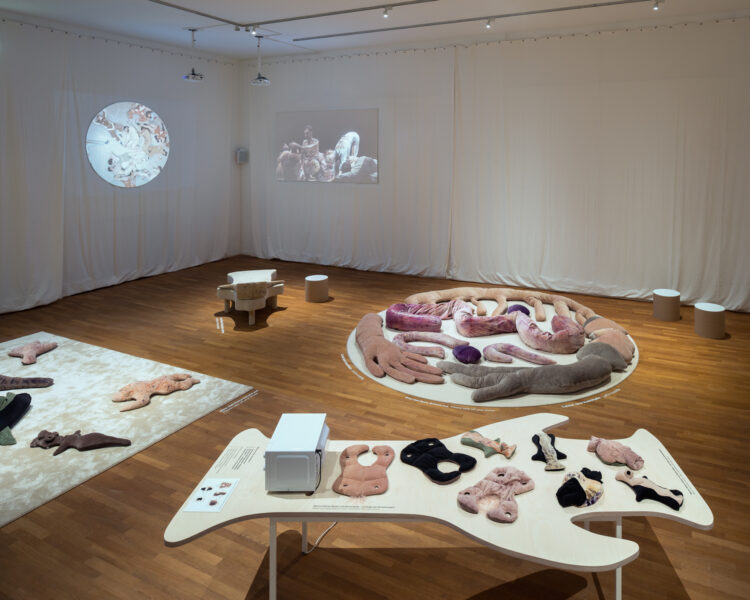
In the exhibition WELL BEINGS Valentina Karga deals with the fears triggered by ecological crises. Based on her own experience with such anxieties, she has developed an interactive installation that invites visitors to try out various exhibits inspired by popular self-care objects. These include hug-pillows and weighted blankets as well as oversized plush toys that are blown-up versions of small prehistoric figurines.
In these days of climate crises, more and more people are affected by eco-anxiety – the chronic fear of environmental collapse. This anxiety disorder can lead to nervousness, sleep disturbances, sensations of suffocation and even depression. Somatic psychotherapy techniques that regulate the nervous system have been shown to have positive effects on such symptoms. Drawing upon personal experience, Karga invites others to experience the immersive self-care environment she has designed. Her design language focuses on human beings as the main cause of climate change and species extinction. In order to give ourselves a new chance, Karga argues, we need to look back to ancient models that can help us to renegotiate our relationship to other forms of life and to the earth as habitat.
The artist delved into researching prehistoric figurines, dating from 2000 to 600 BCE as basis for her work. By interpreting the qualities of these idols as symbols of a non-human world, she tries to open up a new perspective on our image of humanity: One that will cultivate loving responses to our predicament of the climate crisis, in order to reduce anxiety, trauma and, therefore, harm.
Valentina Karga also deals with the topic of eco-anxiety in the video “Adaptation”, filmed especially for the exhibition, and conceived and produced in collaboration with students from the Hamburg University of Fine Arts (HFBK). Film production: Lukas Grubba and Sarah Pech, choreography: Polyxeni Angelidou, live action role-playing (larp) design: Nina Runa Essendrop, Costumes: För Künkel, Sound: Junya Fugita.
WELL BEINGS was first shown at the Museum für Kunst und Gewerbe Hamburg (MK&G) in 2023. Many of the prehistoric figurines were found at the MK&G’s antiquities collection. The solo show is travelling to Staatsgallerie Saarbrücken from November 2024.
-
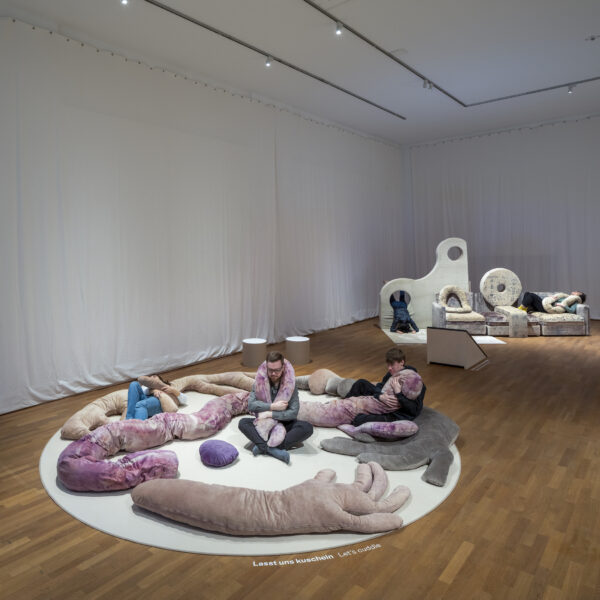
WELL BEINGS at MKG Hamburg, installation view. Photo credit : Henning Rogge
-
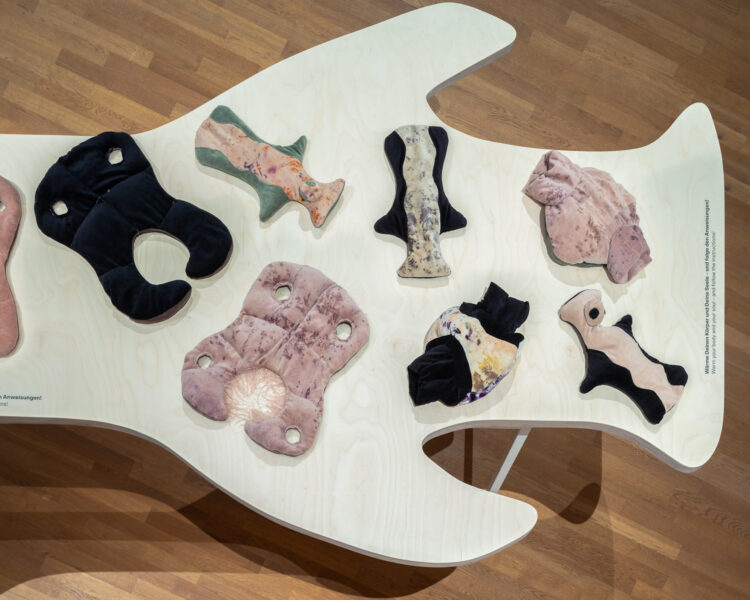
Microwavable Body Warmers (cotton, natural dyes, grape seeds, microwave, wood, dim.variable) One method historically used for pain relief is heat therapy. In the front section of the installation, there is a large table with a microwave and a series of small Body Warmers. These cloth sacks filled with grape seeds are designed by Karga to represent either fragments of the prehistoric idols or their entire bodies. Visitors can warm these in the microwave and wear them to provide gentle heat comfort. Photo credit : Henning Rogge
-

Doomscroll (video, 16:57min) “Doomscrolling” refers to a habit where social media users view negative information in their newsfeeds about tragedies, disasters, and crises for prolonged periods of time. Doomscrolling often occurs on social media apps such as Twitter, TikTok, Instagram or Facebook, and studies have connected the behavior to a decline in well-being and increased feelings of anxiety. This section depicts an oversized mobile phone display “doomscrolling” through news about climate change and our ensuing climate-anxiety.
-

Hug Sofa (repurposed sofa, cotton, natural dyes, foam, 3x1x2m) The Hug Sofa is a comfortable spot from which the Doomscroll can be viewed. This repurposed sofa was re-upholstered with hand-dyed natural cotton from natural plant-based dyes including eucalyptus leaves hand-picked by the artist in her hometown. It includes new elements that were sewn to resemble features from a prehistoric idol. Due to the original idol’s features, it is unclear if these can be considered merely human, or if they belong to a much more complex being. When one sits on this sofa, they become part of this being’s embrace. Photo credit : Henning Rogge
-

Weighted Blanket (cotton, natural dyes, glass beads, dim. variable) Studies have shown that weighted blankets may be useful in relieving anxiety by helping with emotional and physical regulation. Weighted blankets are heavier than normal blankets and can therefore provide users with a feeling similar to when they are hugged, swaddled or held by others. The gentle pressure that a weighted blanket puts on the (human) body can calm its nervous system and lower its heart rate. These weighted blankets incorporate patterns commonly found in various prehistoric idols.
-
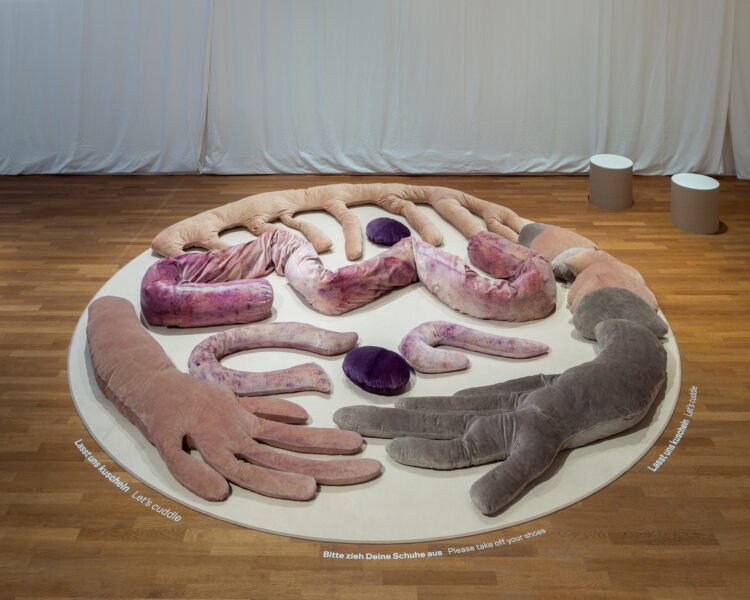
Group Hug (cotton, natural dyes, wool, 4 meters diameter) An important aspect of Valentina Karga’s practice is encouraging collective action and collectively shared experience(s). In Group Hug, visitors can relax on hand-sewn pillows scattered around a circular area – one symbolically free of hierarchy and open for exchange. The pillows have been dyed with natural dyes such as logwood, eucalyptus and madder on natural cotton and their shapes represent the arms, chest, and other features that were hand-painted on one of the idols. Their shapes represent the body (arms, chest, and other features) of a prehistoric Phi-idol from the artist’s home-country, Greece. In Karga’s speculative fiction, these prehistoric idols are promises of a world where nature and culture, human and non-human co-exist in harmony. As pillows, the features have been disjointed and further abstracted, no longer linked to a body, but enabling a collective body to form. Photo credit : Henning Rogge
-
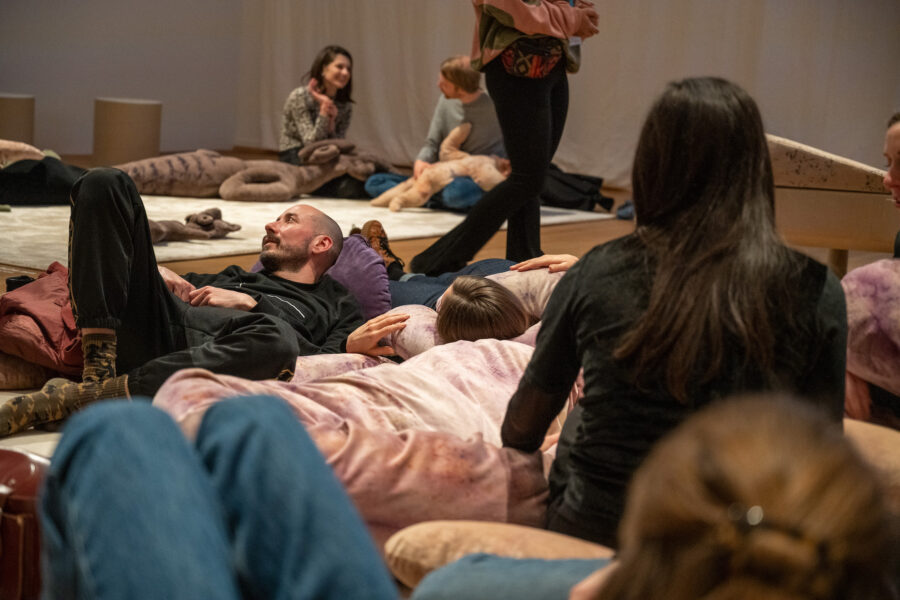
-

Photo credit : Henning Rogge
-
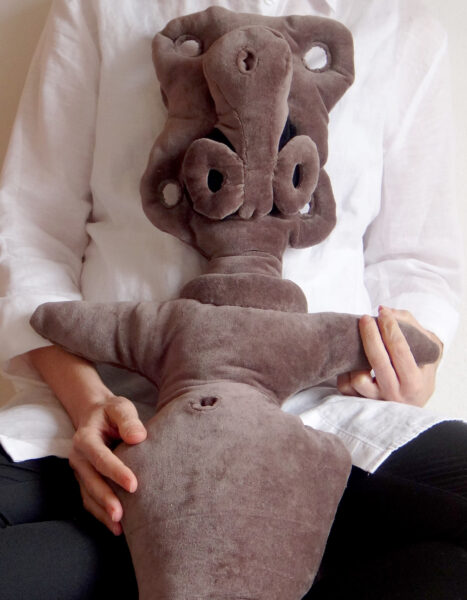
Plush Prehistoric Posthumans (cotton, natural dyes, wool, dimensions variable) A series of miniature prehistoric idols were the inspiration for the large Plush Idols. Stuffed animals are known to reduce feelings of stress in some people, and have thus been used in the therapeutic treatment of anxiety and depression. With that in mind, these toys, hand sewn and hand dyed by the artist and soft to the touch, were designed to be hugged, held, squeezed or adored by visitors.
-

-

Public program at the exhibition space co-curated by Valentina Karga and Seda Yildiz
-
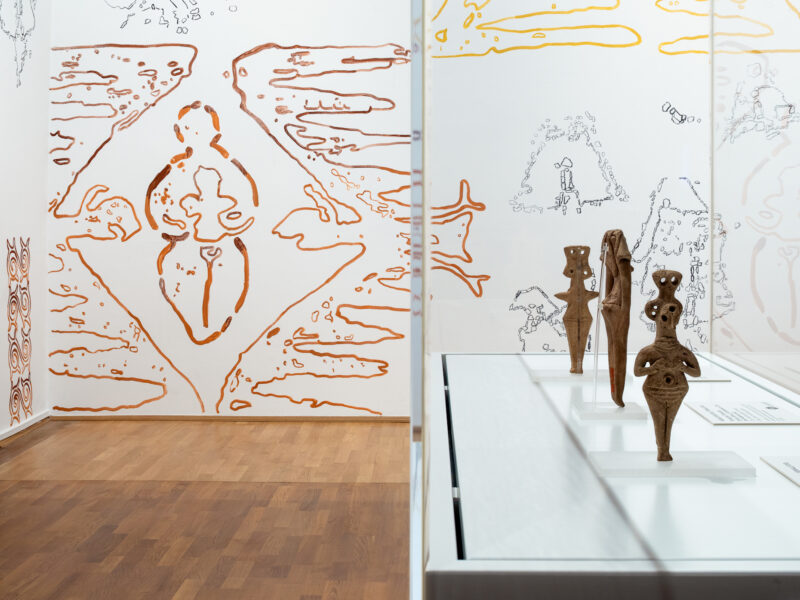
Wall drawing based on the archive of Marija Gimbutas (earthen pigments, charcoal) and original prehistoric figurines from the MKG's Antiquities collection. Photo credit : Henning Rogge
-
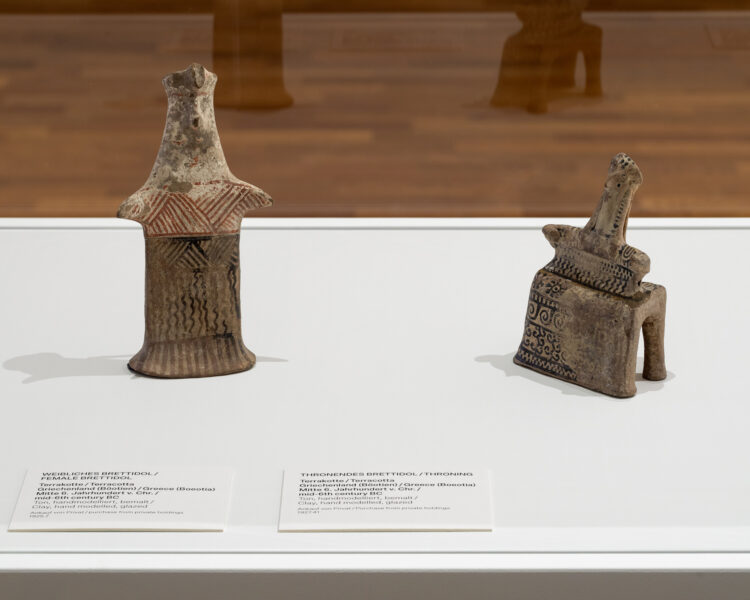
Photo credit : Henning Rogge
-

Photo credit : Henning Rogge
-

Photo credit : Henning Rogge
-

Wall drawing detail. Photo credit : Henning Rogge
-

Prehistoric posthumans: A Visual storytelling (video, 12:26 min) In the 1970s, the Lithuanian archaeologist Marija Gimbutas (*1921–1994) famously interpreted small clay figurines from the Neolithic period as “earth goddesses''. Her research was not only based on archaeological findings but also folklore, mythology and linguistics. Many of Gimbutas’ colleagues interpreted the depictions of bodies with exaggerated breasts, buttocks or vulvas as fertility symbols, but she saw them as signs of a larger system of beliefs that prehistoric Europeans used for making sense of the world. In this short film essay, Valentina Karga discusses the work of Gimbutas and links it to her own investigations of “Prehistoric Posthumans”.
-
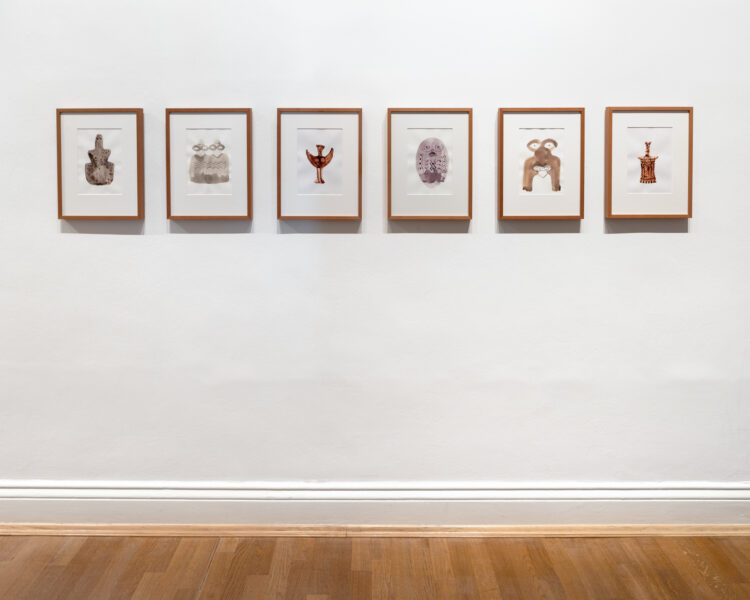
Prehistoric posthumans (natural homemade ink, paper) 15 original drawings made with self-made plant-based ink. Photo credit : Henning Rogge
-
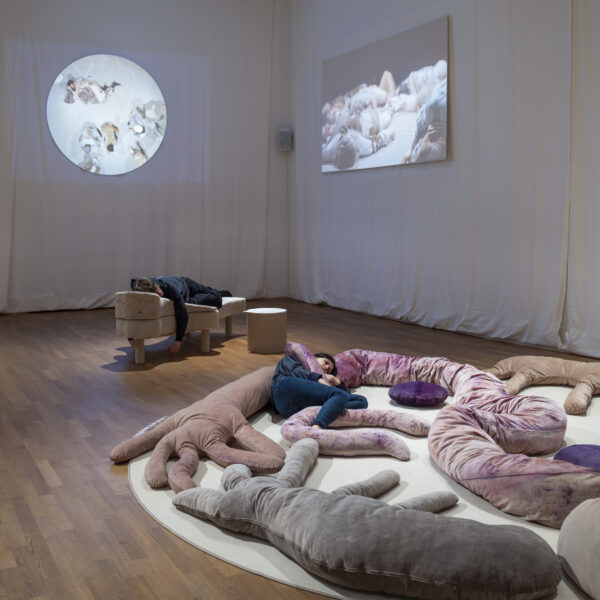
WELL BEINGS at MKG Hamburg, installation view. Photo credit : Henning Rogge
-
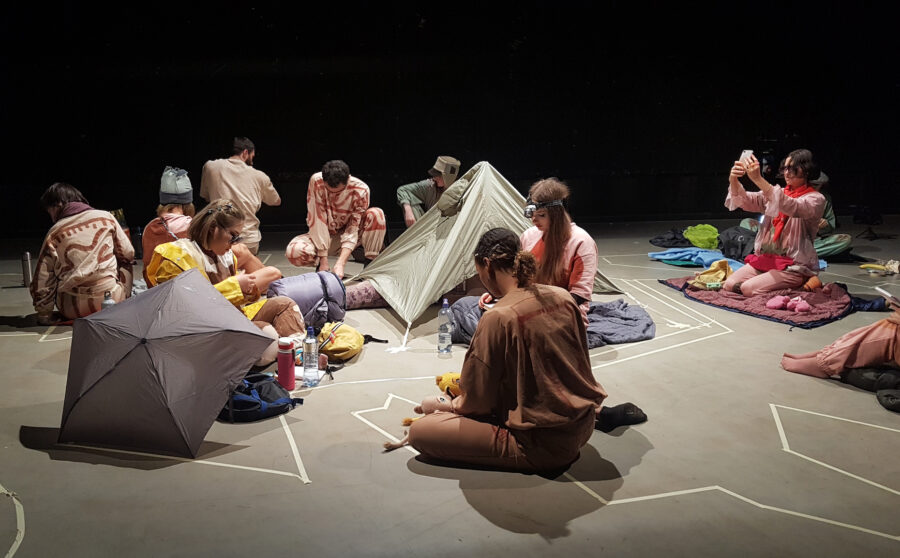
Adaptation, 16:11min, 2023. In this LARP (live-action role play) video installation, Karga and collaborators present a non-verbal story about climate anxiety in three parts: (I) “Climate Angst”, (II) “Adaptation”, and (III) “A New Kind of Existence.” In all, the video imagines and interprets a new trajectory for humanity’s broken coexistence with nature.
-
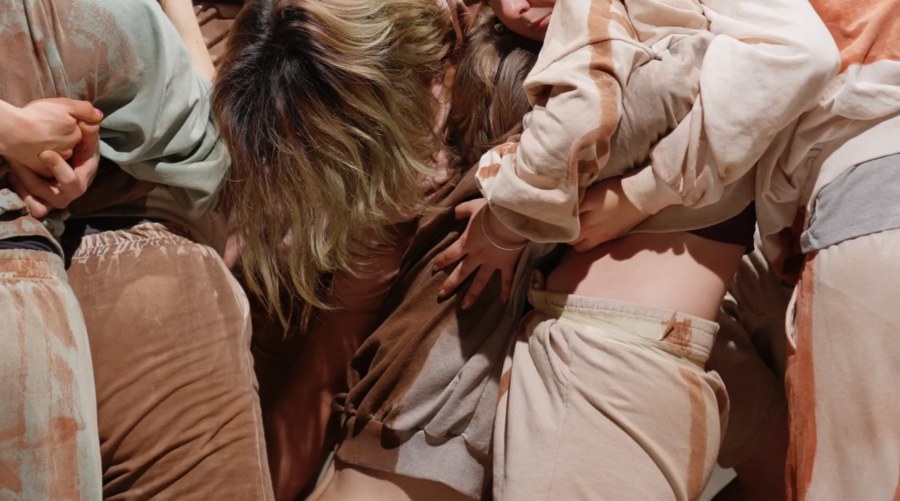
Adaptation, 16:11min, 2023. Valentina Karga and students from HFBK Hamburg as LARP players : Maren Stocklöw, Anna Stapelfeldt, Inga Zhaivoronska, Ben Bakhshi, Alex Bruk, Tolani Abayomi, Oskar Bruheim, Zheming Li, Mo Walker, Mu-Heng Tsai, Rosa Thiemer, Yuting Chen, Folke G. Matthes, Priyanka Sarkar